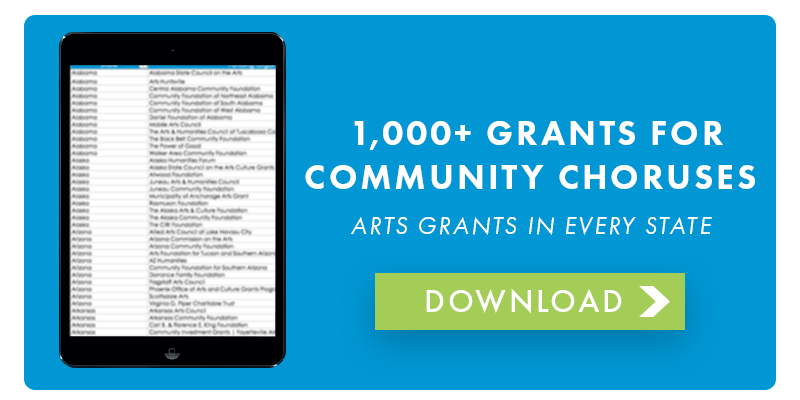
Raise your hand if, during a committee or board meeting, you've heard—or have uttered—some variation on this sentence:
"We should apply for a grant from [organization]. They give out lots of money every year!"
Ah, as I expected: just about all of you.
Many of us know that grant funding is available, but very few of us seem to know the best way to approach the process.
I worked as a full-time grant writer for a nonprofit organization in a previous iteration of my career. Over the course of 4 years, I sent out literally hundreds of grant applications and brought in quite a bit of funding for our organization. I used those skills as I joined the board of my chorus as chair of its development committee, and I'm glad to share some of those insights with you.
Here are my best tips for finding, qualifying, applying for, and managing chorus grants.
Step 1: Identify grants for choruses
Do your research. Start with Chorus Connection's (free!) grants database.
Engage in some reconnaissance work. Collect concert programs (or check out the websites) of other local choral/performing arts organizations. Who is funding them? Might they fund you too?
Start with your local arts council. Set a goal of applying for grant funding from your local arts council. Do a Google search for "[your city] arts council" or "[your city] arts commission" to find your local arts councils. Many of them have grant opportunities for local choirs.
Reach out to other choruses. Board members, executive directors, and even other artistic directors might have helpful insights as to where the best place to start would be in your specific area. Or maybe they'll let you know which foundations aren't funding community choruses at all. Both are valuable things to know!
Maintain a library of opportunities. Keep your own ongoing list of potential grant opportunities for your chorus and ensure your whole fundraising team has access to it.
Step 2: Qualify grant opportunities
Check the guidelines. Visit the website of each grantmaking organization and thoroughly read through their application guidelines/requirements.
Confirm arts-centered support. Ensure that the grantmaking organization supports arts organizations. Look through previous awards and see which arts organizations have received funding. Also, look through their mission and funding areas and see if the arts, or performing arts, are specifically listed.
Check that missions align. Check if your mission is aligned with the kind of support they're offering.
Look for broad support. Organizations offering general operating support are the most ideal. The other kind of support (project-specific support) is more limiting if you aren't already doing the kind of projects they're looking to fund.
Don't apply for bad fits. Determine whether you would need to create projects to make yourself a good fit for funding. If so, think very carefully about moving forward—I've never had luck with this strategy!
Check deadlines. Determine whether you can put together a good proposal in the allotted amount of time.
Check energy output against ROI. Ask yourself: is the amount of time/energy involved in preparing an application congruent to the amount of support being offered? (E.g., will you need to prepare a 20-page proposal with 15 supporting documents for a mere $2500? Perhaps this is not worth it. A better solution may be just to find an individual donor and make that ask directly. If, for the same amount of work, you might get $25,000? Yeah, do that!)
Step 3: Prepare the grant application
Have a clear "case for support." What sets you/your mission/your work apart from other similar organizations? What value do you bring to the community and how do you enhance the cultural life of your area? Why are you deserving of funding—not why are you more deserving than others, just why are you deserving? We're all doing worthy and important work out here!
Start early! As you get started, give yourself at least three weeks to write the proposal, gather required attachments/supporting documents, proofread, etc. As you get used to the process, you'll need less time (and have more things ready to go), but in these early days, you'll want to be sure you have plenty of time.
Don't be afraid to ask questions. You can always reach out to the grantmaking organization with questions you have. Ask for clarification about what a requirement means, what they're looking for in an ideal grant recipient, and the kinds of projects/organizations they are most likely to fund. Program officers are often willing to have those conversations, especially if you're a young, small organization trying to build roots in the community.
Follow the guidelines precisely. If they ask for a two-page letter, make sure it doesn't spill over onto a third page.
Be specific and provide proof. Be specific about what you do, and who you reach, and include as much hard data as you can (number of people who attend concerts, how many counties they represent, other audience demographics, etc.)
Include measurable goals and outcomes. Depending on the nature of the proposal, that might be easier or more difficult, but it never hurts to say things like, "support for this initiative will help us expand our reach by [x]% in the next year," or whatever your goal may be. Ensure this goal can actually be achieved!
Beat the deadlines. If you have a March 15 deadline, try to have it submitted or mailed by March 1. You don't want to be one of the dozens (or hundreds) of applications arriving on the day of the deadline.
Step 4: Awaiting the Final Decision and Next Steps
Be patient. Some foundations will tell you exactly when they send out notifications, which is great. In my experience, many don't, and you can expect to wait 4-6 weeks or so.
Follow up if need be. If it's been a while and you haven't heard about your application, call and ask (unless the application specifically says not to).
Appropriately acknowledge. If you do receive funding (hooray!), see if the letter that accompanies the check indicates how you should acknowledge the gift. If not, standard practice is to send an acknowledgment letter stating that the funds are tax-deductible and that no services were promised or rendered in exchange for the gift. Lots of grant acknowledgment templates are available online to guide you on all that.
Send required reports. If you receive a grant, it is imperative that you follow up with any reports the foundation may require. If you find yourself unable to fulfill the terms of a grant (e.g., if you can't implement the project you said you would in the time allotted), communicate with the foundation immediately. Ask if you can extend the term of the grant by a year or if you can repurpose the funds for another initiative (have a specific one ready to offer). Often, foundations understand this.
Ask for feedback. If you are declined for a gift, see if you can get any feedback from the program manager about what you could do to make a future application more successful.
Try again! If you don't get funding the first time, apply the following year again. I use a "three strikes" rule. If I apply unsuccessfully for three years in a row, I usually move on. From time to time, foundations change their funding priorities, though, and you might want to re-apply when they do. You never know!
Final Thoughts
Everyone's experience with applying for grants is different. My best advice would be to find one, apply, and see what happens.
Don't be discouraged if you aren't immediately successful.
In my experience, funding for small-scale arts organizations is tough. There are so many of us, and we're all competing for the same pool of dollars. Unless you have a highly-targeted education initiative, an outreach program to underprivileged youth/communities, or something along those lines, it can be challenging to find lots of grant opportunities.
My own experience leads me to believe you're likely to have more success with building a broad base of individuals and loyal donors who are passionate about you and the chorus and want to support you directly. That's where your best shot for long-term support will be. Bring those folks onto your board, and get them to evangelize about you in the community to their friends and contacts.
Good luck out there—may all your funding wishes be granted!
Kenny Litvack is currently Managing Director of the Bucks County Choral Society and Marketing Manager of Princeton Pro Musica. He is also Past President of Princeton Pro Musica, where he has sung as part of its professional core since 2005. When not engrossed in the world of choral music, Kenny enjoys spending time with his husband, their dog Murphy, and their nine nieces and nephews. To learn more about Kenny's work as an arts nonprofit consultant/coach, visit kennylitvack.com.


